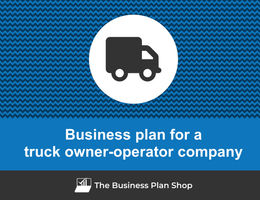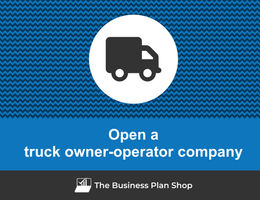How to create a financial forecast for a truck owner-operator company?
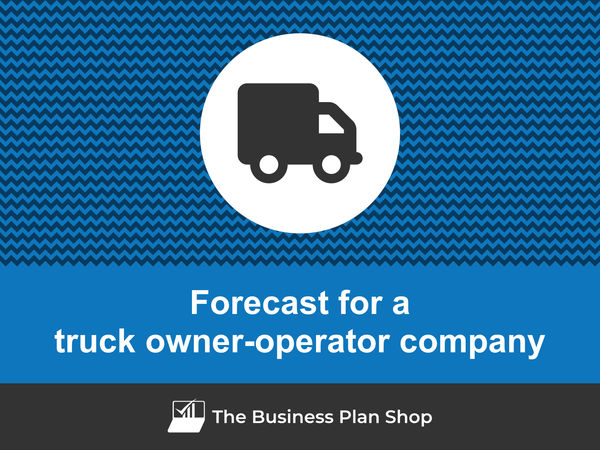
If you are serious about keeping visibility on your future cash flows, then you need to build and maintain a financial forecast for your truck owner-operator company.
Putting together a truck owner-operator company financial forecast may sound complex, but don’t worry, with the right tool, it’s easier than it looks, and The Business Plan Shop is here to guide you.
In this practical guide, we'll cover everything you need to know about building financial projections for your truck owner-operator company.
We will start by looking at why they are key, what information is needed, what a forecast looks like once completed, and what solutions you can use to create yours.
Let's dive in!
Why create and maintain a financial forecast for a truck owner-operator company?
Creating and maintaining an up-to-date financial forecast is the only way to steer the development of your truck owner-operator company and ensure that it can be financially viable in the years to come.
A financial plan for a truck owner-operator company enables you to look at your business in detail - from income to operating costs and investments - to evaluate its expected profitability and future cash flows.
This gives you the visibility needed to plan future investments and expansion with confidence.
And, when your trading environment gets tougher, having an up to date truck owner-operator company forecast enables you to detect potential upcoming financing shortfalls in advance, enabling you to make adjustments or secure financing before you run out of cash.
It’s also important to remember that your truck owner-operator company's financial forecast will be essential when looking for financing. You can be 100% certain that banks and investors will ask to see your numbers, so make sure they’re set out accurately and attractively.
Need a convincing business plan?
The Business Plan Shop makes it easy to create a financial forecast to assess the potential profitability of your projects, and write a business plan that’ll wow investors.

What information is used as input to build a truck owner-operator company financial forecast?
A truck owner-operator company's financial forecast needs to be built on the right foundation: your assumptions.
The data required to create your assumptions will depend on whether you are a new or existing truck owner-operator company.
If you are creating (or updating) the forecast of an existing truck owner-operator company, then your main inputs will be historical accounting data and operating metrics, and your team’s view on what to expect for the next three to five years.
If you are building financial projections for a new truck owner-operator company startup, you will need to rely on market research to form your go-to-market strategy and derive your sales forecast.
For a new venture, you will also need an itemised list of resources needed for the truck owner-operator company to operate, along with a list of equipment required to launch the venture (more on that below).
Now that you understand what is needed, let’s have a look at what elements will make up your truck owner-operator company's financial forecast.
The sales forecast for a truck owner-operator company
From experience, it usually makes sense to start your truck owner-operator company's financial projection with the revenues forecast.
The inputs used to forecast your sales will include the historical trading data of your truck owner-operator company (which can be used as a starting point for existing businesses) and the data collected in your market research (which both new ventures and existing businesses need to project their sales forward).
Your truck owner-operator company's sales forecast can be broken down into two key estimates:
- The average price
- The number of monthly transactions
To assess these variables accurately, you will need to consider the following factors:
- Fuel prices: As a truck owner-operator, you are responsible for covering the cost of fuel for your trucks. Fluctuations in fuel prices can greatly impact your average price per transaction, as well as your overall profitability.
- Maintenance costs: The upkeep and maintenance of your trucks is essential for ensuring their safe and efficient operation. Any unexpected repairs or increases in maintenance costs can affect your average price per transaction, as well as your monthly profits.
- Competition: The presence of other truck owner-operators in your area can have an impact on your average price per transaction. If there is a lot of competition, you may need to lower your prices in order to remain competitive, whereas if you are the only owner-operator in the area, you may be able to charge higher prices.
- Seasonality: Depending on the type of goods you transport, your business may experience fluctuations in demand throughout the year. For example, if you primarily transport holiday goods, your business may experience a surge in transactions during the holiday season, but a decrease during the rest of the year.
- Industry regulations: Changes in industry regulations can impact your business in various ways. For example, stricter emissions regulations may require you to invest in newer, more expensive trucks, thereby increasing your average price per transaction. Alternatively, changes in weight restrictions may limit the amount of goods you can transport, affecting your monthly transactions.
Once you have a sales forecast in place, the next step will be to work on your overhead budget. Let’s have a look at that now.
Need a convincing business plan?
The Business Plan Shop makes it easy to create a financial forecast to assess the potential profitability of your projects, and write a business plan that’ll wow investors.

The operating expenses for a truck owner-operator company
Once you know what level of sales you can expect, you can start budgeting the expenses required to operate your truck owner-operator company on a daily basis.
Expenses normally vary based on how much revenue you anticipate (which is why, from experience, it is always better to start your forecast with the topline projection), and where your business is based.
Operating expenses for a truck owner-operator company will include some of the following items:
- Fuel Costs: As a truck owner-operator, you will be responsible for covering the cost of fuel for your truck. This can include diesel, gasoline, or alternative fuels depending on the type of truck you own.
- Maintenance and Repairs: Trucks require regular maintenance and repairs to keep them in good working condition. This can include oil changes, tire replacements, and other routine maintenance tasks.
- Insurance: It is important to have insurance coverage for your truck in case of accidents or other unexpected events. This can include liability insurance, cargo insurance, and physical damage insurance.
- Permits and Licenses: Trucking companies are required to have various permits and licenses to operate. These can include state and federal permits, as well as special permits for oversized or hazardous loads.
- Toll Fees: If you are driving on toll roads, you will be responsible for paying toll fees. These can add up quickly, so it is important to budget for them in your operating expenses.
- Staff Costs: If you have employees, you will need to include their salaries, benefits, and other related expenses in your operating costs. This can include truck drivers, dispatchers, and administrative staff.
- Accounting and Bookkeeping Fees: To ensure that your financial records are accurate and up-to-date, you may need to hire an accountant or bookkeeper. These services can be costly, but they are essential for managing your finances effectively.
- Software Licenses: Certain software programs, such as dispatch or accounting software, may require annual license fees. These costs should be factored into your operating expenses.
- Parking and Storage Fees: If you need to park or store your truck at a facility, you will need to pay fees for this service. These fees can vary depending on the location and duration of the storage.
- Uniforms and Safety Gear: As a truck owner-operator, you will need to provide uniforms and safety gear for yourself and any employees. This can include high-visibility clothing, hard hats, and steel-toed boots.
- Office Supplies and Equipment: Even if you operate primarily on the road, you may still need to purchase office supplies and equipment for administrative tasks. This can include computers, printers, and office supplies like paper and ink.
- Marketing and Advertising: To attract new clients and customers, you may need to invest in marketing and advertising efforts. This can include creating a website, printing business cards, or placing ads in industry publications.
- Banking Fees: As a business owner, you may incur fees for things like wire transfers, overdrafts, and account maintenance. These fees should be included in your operating expenses.
- Road Taxes and Permits: Depending on the states or countries you operate in, you may need to pay road taxes or purchase special permits. These fees can vary, so it is important to research and budget for them.
- Taxes and Business Registration: As a business owner, you will need to pay taxes on your income and register your business with the appropriate authorities. These costs should be included in your operating expenses.
This list will need to be tailored to the specificities of your truck owner-operator company, but should offer a good starting point for your budget.
What investments are needed to start or grow a truck owner-operator company?
Once you have an idea of how much sales you could achieve and what it will cost to run your truck owner-operator company, it is time to look into the equipment required to launch or expand the activity.
For a truck owner-operator company, capital expenditures and initial working capital items could include:
- Truck Purchase: As a truck owner-operator, one of your biggest capital expenditures will be purchasing a truck. This includes the cost of the truck itself, as well as any additional equipment or modifications needed for your specific business needs.
- Trailer Purchase: In addition to a truck, you may also need to purchase a trailer to transport goods. This can be a significant expense, especially if you need specialized trailers for certain types of cargo.
- Maintenance and Repairs: As a truck owner-operator, it is important to budget for regular maintenance and unexpected repairs for your truck and trailer. This can include oil changes, tire replacements, and engine repairs.
- Technology and Equipment: In today's digital age, investing in technology and equipment can greatly improve the efficiency and effectiveness of your trucking business. This can include GPS systems, electronic logging devices, and other tools to track and manage your operations.
- Facility Expenses: Depending on the size and scope of your trucking business, you may also need to budget for facility expenses such as rent, utilities, and insurance for your office or warehouse space.
Again, this list will need to be adjusted according to the specificities of your truck owner-operator company.
Need a convincing business plan?
The Business Plan Shop makes it easy to create a financial forecast to assess the potential profitability of your projects, and write a business plan that’ll wow investors.

The financing plan of your truck owner-operator company
The next step in the creation of your financial forecast for your truck owner-operator company is to think about how you might finance your business.
You will have to assess how much capital will come from shareholders (equity) and how much can be secured through banks.
Bank loans will have to be modelled so that you can separate the interest expenses from the repayments of principal, and include all this data in your forecast.
Issuing share capital and obtaining a bank loan are two of the most common ways that entrepreneurs finance their businesses.
What tables compose the financial plan for a truck owner-operator company?
Now let's have a look at the main output tables of your truck owner-operator company's financial forecast.
The forecasted profit & loss statement
The profit & loss forecast gives you a clear picture of your business’ expected growth over the first three to five years, and whether it’s likely to be profitable or not.
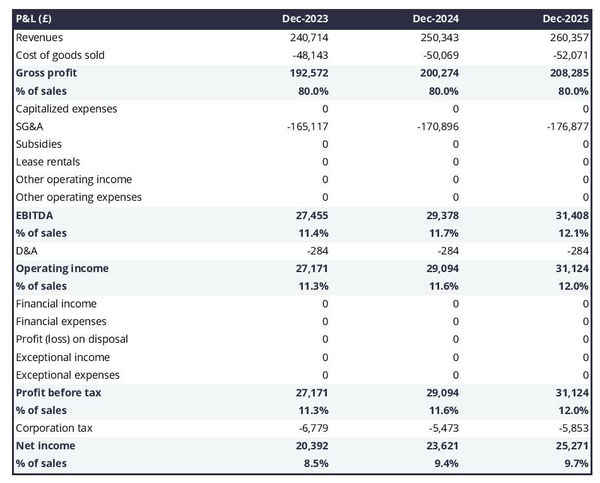
A healthy truck owner-operator company's P&L statement should show:
- Sales growing at (minimum) or above (better) inflation
- Stable (minimum) or expanding (better) profit margins
- A healthy level of net profitability
This will of course depend on the stage of your business: numbers for an established truck owner-operator company will look different than for a startup.
The projected balance sheet
Your truck owner-operator company's forecasted balance sheet enables you to assess your financial structure and working capital requirements.
It is composed of three types of elements: assets, liabilities and equity:
- Assets: represent what the business owns and uses to produce cash flows. It includes resources such as cash, equipment, and accounts receivable (money owed by clients).
- Liabilities: represent funds advanced to the business by lenders and other creditors. It includes items such as accounts payable (money owed to suppliers), taxes due and loans.
- Equity: is the combination of what has been invested by the business owners and the cumulative profits and losses generated by the business to date (which are called retained earnings). Equity is a proxy for the value of the owner's stake in the business.
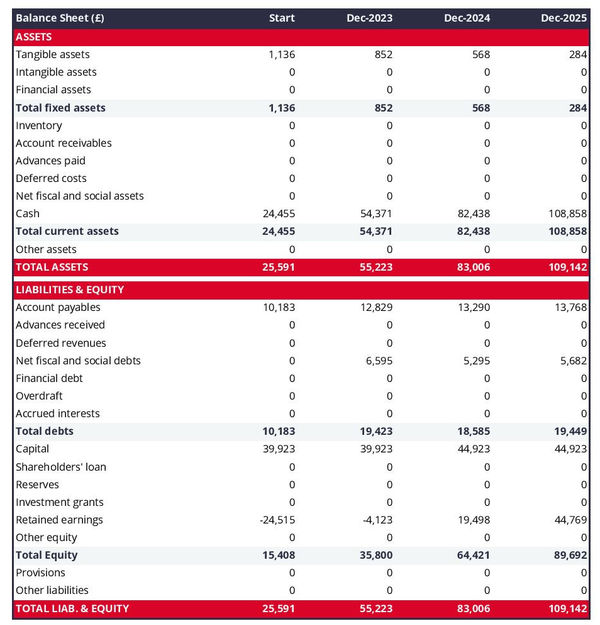
The cash flow forecast
Your truck owner-operator company's cash flow forecast shows how much cash your business is expected to consume or generate in the years to come.
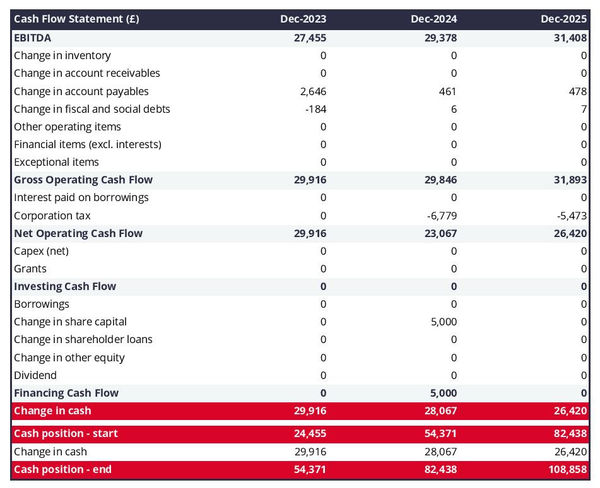
It is best practice to organise the cash flow forecast by nature to better explain where cash is used or generated by the truck owner-operator company:
- Operating cash flow: shows how much cash is generated by the operating activities
- Investing cash flow: shows how much will be invested in capital expenditure to maintain or expand the business
- Financing cash flow: shows if the business is raising new capital or repaying financiers (debt repayment, dividends)
Keeping an eye on (and regularly updating) your truck owner-operator company's cash flow forecast is key to ensuring that your business has sufficient liquidity to operate normally and to detect financing requirements as early as possible.
If you are trying to raise capital, you will normally be asked to provide a monthly cash flow forecast in your truck owner-operator company's financial plan - so that banks or investors can assess seasonal variation and ensure your business is appropriately capitalised.
Need a convincing business plan?
The Business Plan Shop makes it easy to create a financial forecast to assess the potential profitability of your projects, and write a business plan that’ll wow investors.

Which tool should you use to create your truck owner-operator company's financial forecast?
Using the right tool or solution will make the creation of your truck owner-operator company's financial forecast much easier than it sounds. Let’s explore the main options.
Using online financial forecasting software to build your truck owner-operator company's projections
The modern and easiest way is to use professional online financial forecasting software such as the one we offer at The Business Plan Shop.
There are several advantages to using specialised software:
- You can easily create your financial forecast by letting the software take care of the financial calculations for you without errors
- You have access to complete financial forecast templates
- You get a complete financial forecast ready to be sent to your bank or investors
- You can easily track your actual financial performance against your financial forecast, and recalibrate your forecast as the year goes by
- You can create scenarios to stress test your forecast's main assumptions
- You can easily update your forecast as time goes by to maintain visibility on future cash flows
- You have a friendly support team on standby to assist you when you are stuck
- It’s cost-efficient and much cheaper than using an accountant or consultant (see below)
If you are interested in this type of solution, you can try our forecasting software for free by signing up here.
Calling in a financial consultant or chartered accountant
Enlisting the help of a consultant or accountant is also a good way to obtain a professional truck owner-operator company financial forecast.
The downside of this solution is its cost. From experience, obtaining a simple financial forecast over three years (including a balance sheet, income statement, and cash flow statement) is likely to cost a minimum of £700 or $1,000.
The indicative cost above, is for a small business, and a forecast is done as a one-shot exercise. Using a consultant or accountant to track your actuals vs. forecast and to keep your financial projections up to date on a monthly or quarterly basis will cost a lot more.
If you opt for this solution, make sure your accountant has in-depth knowledge of your industry, so that they may challenge your figures and offer insights (as opposed to just taking your assumptions at face value to create the forecast).
Why not use a spreadsheet such as Excel or Google Sheets to build your truck owner-operator company's financial forecast?
Creating an accurate and error-free truck owner-operator company financial forecast with a spreadsheet is very technical and requires a deep knowledge of accounting and an understanding of financial modelling.
Very few business owners are financially savvy enough to be able to build a forecast themselves on Excel without making mistakes.
Lenders and investors know this, which is why forecasts created on Excel by the business owner are often frowned upon.
Having numbers one can trust is key when it comes to financial forecasting and to that end using software is much safer.
Using financial forecasting software is also faster than using a spreadsheet, and, with the rise of artificial intelligence, software is also becoming smarter at helping us analyse the numbers to make smarter decisions.
Finally, like everything with spreadsheets, tracking actuals vs. forecasts and keeping your projections up to date as the year progresses is manual, tedious, and error-prone. Whereas financial projection software like The Business Plan Shop is built for this.
Need a convincing business plan?
The Business Plan Shop makes it easy to create a financial forecast to assess the potential profitability of your projects, and write a business plan that’ll wow investors.

Use our financial forecast templates for inspiration
The Business Plan Shop has dozens of financial forecast examples available.
Our templates contain both a financial forecast and a written business plan which presents, in detail, the company, the team, the strategy, and the medium-term objectives.
Our templates are a great source of inspiration, whether you just want to see what a complete business plan looks like, or are looking for concrete examples of how you should model financial elements in your own forecast.
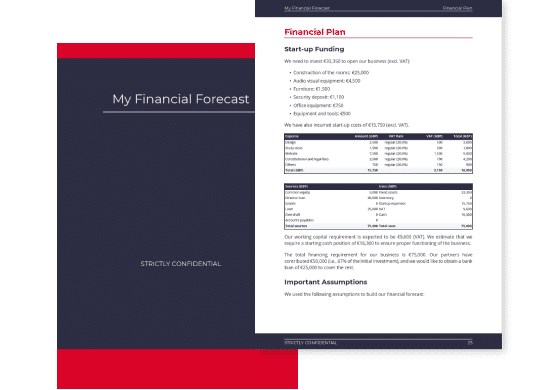
Takeaways
- A financial projection shows expected growth, profitability, and cash generation for your business over the next three to five years.
- Tracking actuals vs. forecast and keeping your financial forecast up-to-date is the only way to maintain visibility on future cash flows.
- Using financial forecasting software makes it easy to create and maintain up-to-date projections for your truck owner-operator company.
You have reached the end of our guide. We hope you now have a better understanding of how to create a financial forecast for a truck owner-operator company. Don't hesitate to contact our team if you have any questions or want to share your experience building forecasts!
Need a convincing business plan?
The Business Plan Shop makes it easy to create a financial forecast to assess the potential profitability of your projects, and write a business plan that’ll wow investors.

Also on The Business Plan Shop
- Example of financial projections
- How to create a sales forecast for a business?
- Financial forecast for a business idea
Know someone who runs or wants to start a truck owner-operator company? Share our financial projection guide with them!


